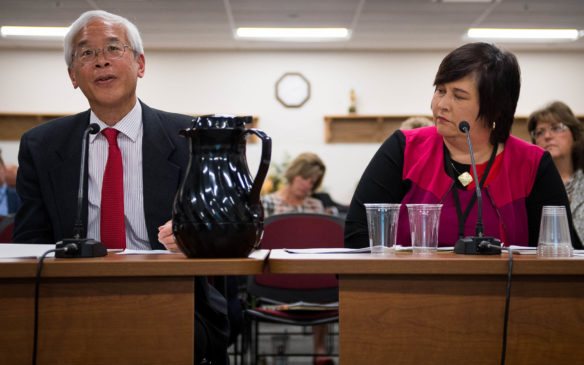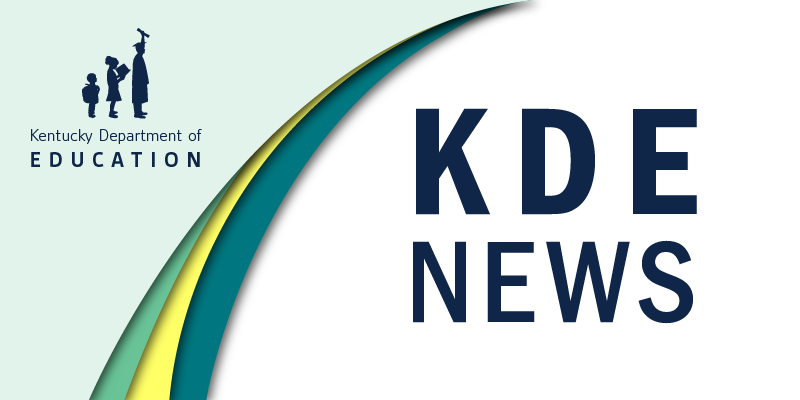
Kentucky Department of Education Associate Commissioner Rhonda Sims, right, and Brian Gong, facilitator of the Accountability Steering Committee, present the proposed new accountability system to the Kentucky Board of Education during its June meeting.
Photo by Bobby Ellis, June 7, 2017
(FRANKFORT, Ky.) – Kentucky schools would be rated from one to five stars under a proposed accountability system discussed at the June 7 meeting of the Kentucky Board of Education in Frankfort.
The system has been in development for more than a year with input from thousands of Kentucky educators and the general public. The system at a glance shows that schools and districts would earn a star rating and a possible supplemental designation focused on achievement gaps based on their performance on various indicators:
- Proficiency – performance level of Novice, Apprentice, Proficient or Distinguished earned by students as measured on state academic assessments. The proficiency indicator includes an incentive for schools to move students up from the lowest performance levels as well as moving students to the Distinguished level. As the system stands, a school cannot entirely offset low-performing students with those performing at Proficient or better.
- Growth (elementary and middle school levels) – a student’s continuous improvement toward his/her personal goal of proficiency or beyond. Each student is evaluated as to whether he/she is catching up to become proficient; keeping up or staying proficient; or moving up from proficient to distinguished.
- Transition readiness – a student’s attainment of the necessary knowledge, skills and dispositions to successfully transition to the next level of his or her education career. At high school, a student may earn an optional recognition for readiness in more than one area or for an advanced work ethic.
- Achievement gap closure – eliminating the disparity in performance between student groups with a goal of reducing or closing the gap by moving all students to higher levels and moving those at the lowest levels more rapidly.
- Opportunity and access – equitable availability to standards, content, programs, quality educators and educational experiences that support and lead to student success.
Districts and charter schools also will develop a locally-defined measure that highlights an area for improvement or charter school objective.
The system includes intermediate and long-term goals to:
- increase student proficiency rates significantly for all students by 2030 (for example, raise elementary/middle school math proficiency from 55 percent to 75 percent or above; similar goals
would be set for each content area); and - decrease the achievement gap of lower-performing student groups by 50 percent by 2030
The board struggled with whether the goals were ambitious enough, or whether the goals would be realistic and attainable if set higher.
“I support what’s been put together here,” board member Roger Marcum said. “I trust and hope that the educators of Kentucky want all students to reach proficiency and beyond, and they’re going to work to achieve way beyond what we expect.”
“If we adopted the basic model that is here today, I’m confident it is infinitely better than the accountability model that came before it,” board member Gary Houchens added.
The board considered the proposed accountability plan as part of the first reading of 703 KAR 5:270, the regulation governing implementation of a new accountability system in Kentucky under Senate Bill 1 (2017) and the federal Every Student Succeeds Act.
In August, the board is scheduled to finalize the accountability plan and consider the second reading of the regulation, along with several others that also had a first reading at Wednesday’s meeting:
- 780 KAR 3:072, Attendance, compensatory time, and leave for certified and equivalent service;
- 780 KAR 3:080, Extent and duration of school term, use of school days and extended employment; and
- 702 KAR 7:065, Designation of agent to manage middle and high school interscholastic athletics and revisions in Kentucky High School Athletic Association Bylaws (KHSAA).
The board unanimously voted to remove Fleming and Robertson Counties and Caverna Independent School Districts from state assistance. With support from Kentucky Department of Education school improvement staff, each district has built capacity and shown marked improvement on the issues that put them in state assistance.
Also at its meeting, the board approved:
- Amendments to the KY Tech Policies and Procedures Manual (state-operated area technology centers);
- 2017-18 Preschool Grant Allotment System and Funding Rates – with a statement by committee members that the amount of money allocated for preschool is still too low.
- Voluntary Certification of Non-Public Schools;
- Repeal of 704 KAR 7:050, Student Discipline Guidelines;
- New District Facility Plans: Augusta Independent, Bell County, Bourbon County, Boyd County, Breathitt County, Campbell County, Christian County, Clinton County, East Bernstadt Independent, Grant County, Grayson County, Hardin County, Jackson County, Jefferson County, Kenton County, LaRue County, Lincoln County, Ludlow Independent, Menifee County, Montgomery County, Newport Independent, Oldham County, Pendleton County, Russell Independent, Southgate Independent, Walton-Verona Independent, Wolfe County and Woodford County school districts;
- District Facility Plan Amendments: Jessamine, Marion, Mercer and Shelby County school districts;
- 2018 Minimum Specifications for School Buses;
- 2017-18 Local District Indirect Cost Rates;
- Capital Funds Requests Guidelines per HB 471;
- 2016 Report, 2016 Exceptions and 2018 Plan as Required by 702 KAR 1:115, Annual In-Service Training of District Board Members;
- Kentucky Educational Technology System (KETS) FY18 Unmet Need for Local Education Agencies (LEAs); and
- Kentucky Educational Technology System (KETS) Trust Fund – FY 2018 Allocation.
At the June 7 meeting, board members expressed interest in a proposal that it develop a comprehensive statewide reading policy. Similar policies are in place in other states, including Ohio, Indiana, North Carolina and Florida. Among other things, the policy would provide for intensive intervention for K-3 students, include a reading guarantee that 3rd-graders read on grade level before they move to the 4th grade, and support students who are retained with even more intense intervention.
Recently in a meeting with the governor, Commissioner Stephen Pruitt proposed a similar program – Kentucky Reading Plus.
“I would like to see us have some conversations with the legislature to put some funds behind it,” Pruitt said. “I implemented this very type of program in Georgia and we saw a great deal of benefit, but it has to be thoughtful and strategic as we move forward, and I would lend my support to that.”
The board agreed to discuss the matter at a future meeting.
Board members welcomed three new gubernatorial-appointed, nonvoting advisers: Tracy Cusick, a parent from Union; Kathy Gornick, co-founder and president of THIEL Audio and chairman of Newton’s Attic, a nonprofit educational organization; and Wayne Lewis, associate professor of Educational Leadership at the University of Kentucky, and the executive director of education policy and programs for the Kentucky Education and Workforce Development Cabinet. A fourth adviser, Joe Papalia, an entrepreneur and executive with broad engineering, manufacturing and sales experience, was unable to attend the meeting.
Visit the board portal to access the agenda and supporting materials online.
The board’s next regular meeting is Aug. 2-3, in Frankfort.




Leave A Comment